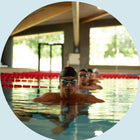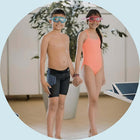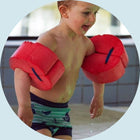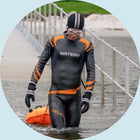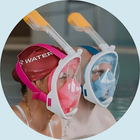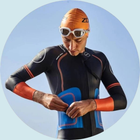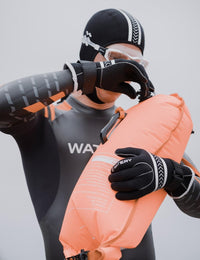What Are Water Warts?
Molluscum contagiosum are what we also call water warts. They are small bumps that appear on the skin. There can be many or just a few, and they can vary in size. They originate from a viral infection with poxvirus in the outer layers of the skin, but you won't experience any other symptoms besides them, so you don't become specifically ill from having them. In fact, you can have water warts for a long time without even noticing them.
Many people become worried when they discover the warts because they initially look peculiar and unnatural. It's a condition that is generally not well-known, making it not always easy to diagnose on your own. However, they are quite easy to recognize once you know they exist.
If you notice something you think could be water warts, it's advisable to call and ask for help with water warts from a dermatologist and possibly schedule an appointment to confirm your suspicion.
What Do Water Warts Look Like?
Water warts range from 2 to 10 mm in diameter. They are smooth, pearl-like bumps with a depression in the middle containing a gelatinous mass. Water warts can be skin-coloured, white, or reddish. Some people get many, while others get just a few water warts, but they usually appear in the same areas. Regardless of how many you have, they can be treated, but how much they bother you can vary from person to person, depending on how many you have on your body.
Who Gets Water Warts?
As mentioned, anyone can get water warts, but some groups are more susceptible than others. First and foremost, many kids get water warts, especially kids who swim a lot or suffer from eczema. The youngest in kindergarten and nursery school age are more vulnerable than others.
Adults can also get water warts, but it occurs less frequently than in kids. Adults with weakened immune systems should be aware that they are more susceptible to getting them than others. Although water warts can be visually unpleasant and irritating to have on the body, as mentioned earlier, they are not dangerous, so you shouldn't be concerned about the warts themselves if you get them.
Where on the Body Can You Get Water Warts?
You can get water warts in many places on the body. They can appear around the:
- Face
- Chest
- Back
- Arms
- Legs
- Genital area
Are Water Warts Dangerous?
Water warts are essentially a benign condition that goes away on its own if you wait long enough. It can take up to 2 years for them to disappear. They are not dangerous, so you shouldn't worry if you have them. However, they can be an indicator that your immune system is weakened, which may be a good reason for a doctor's visit just to be safe.
What Are the Symptoms of Water Warts?
The symptoms of water warts are relatively simple because they are related only to the wart itself. You can recognize the water wart as a shiny bump on the skin with a depression in the middle. Often, eczema appears before the wart disappears. It is red and itchy but should not be a cause for concern, as it is a sign that the wart is on its way out.

How Is the Diagnosis Made?
Both your general practitioner and a dermatologist can make the diagnosis. The warts are easy to recognize to the trained eye. If you are unsure whether your kid has water warts or eczema, the doctor can quickly determine it for you, so you can get the matter clarified.
Why Do People Get Water Warts?
There are different reasons why people get water warts. When talking about kids, it is typically because they play closely together and put things in their mouths. Therefore, kids who swim a lot are also more susceptible. In the swimming pool, there are many situations where the virus can spread.
As adults, you can get water warts, for example, by using shared towels to dry your hands, but the most common cause is through sexual intercourse. Because they are transmitted through direct contact, they can also be considered a sexually transmitted disease. For this reason, water warts are often seen in the vagina or around the penile area in adults.
Are Water Warts Contagious?
As indicated above, water warts are contagious, but they are not as contagious as you might think. For this reason, the virus is not as widespread as many other small viruses. It is most contagious through direct contact but can also be transmitted indirectly. However, the risk of indirect transmission is very low.
From the time of infection, it takes two to eight weeks for the warts to appear. They only spread while they are visible. After touching them, you should always remember to wash your hands; otherwise, you increase the risk of infecting others.
Are Water Warts Hereditary?
No, water warts are a viral infection, and they are not hereditary. However, the tendency to get them may be greater if a kid frequently suffers from eczema, which is often caused by sensitive skin that can be inherited from parents.

Available Treatments for Water Warts
Local Molluscum Contagiosum treatment: Warts consists of 10% potassium hydroxide cutaneous solution and is available over the counter.
Surgical removal: Water warts can also be surgically removed, but it can be painful. This is done either by pricking out the contents with a needle or by scraping them off with a sharp instrument. The skin is locally anaesthetised with a numbing cream beforehand.
Freezing treatment: Water warts can also be treated by freezing them.
However, treatment is typically not necessary. It is a benign condition that will resolve on its own without treatment. Therefore, treatments should only be used if there is a valid reason for them. Be aware that water warts may leave small scars that will disappear over time. You cannot prevent this, and it has nothing to do with the treatment method.
Should You Contact a Doctor?
You should only contact a doctor if you are unsure about something or if the water warts bother you. They can itch or hurt, and in such cases, they should be removed. If a kid has numerous bothersome warts and a lot of eczema, they should be seen by a doctor. Adults with numerous water warts on their bodies should be examined by their doctor since it is a condition that requires treatment.
The discount code can be used by all new customers on all products on the website, including the products recommended here in the article. What are you waiting for? Get more out of your time in and on the water!
GET A DISCOUNT CODE WITH 10% OFF
What You Can Do Yourself
Initially, it's essential to be patient and wait because water warts will eventually disappear on their own, but it can take a long time. To prevent transmission, remember to wash your hands if you touch the warts. If a kid has water warts, it's important to remind them not to scratch them and to wash their hands more often than usual.
If the water warts have not disappeared on their own within a few months, you can try brushing them with wart remedies. In this regard, Molusk is initially a suitable choice because it can be purchased over the counter at the pharmacy. There's nothing wrong if they take a long time to disappear, but of course, it can bother you that they are there.
You can also try alternative treatment for water warts. Zymaderm for water warts is a good natural option, as it does not contain actual medicine, but natural ingredients that can reduce the occurrence of warts.

Ways to Avoid or Worsen Water Warts
In principle, it is challenging to completely avoid water warts. If your kid goes to the swimming pool a lot, they will always be in the risk group. If your kid tends to have eczema, using a good cream daily can help.
As mentioned earlier, adults are not as vulnerable. If you want to avoid water warts through sexual transmission, it is a good idea to use a condom, although it does not guarantee that you will not be infected.
You should never prick the water warts yourself. It can be painful, and it can also lead to infections or noticeable scars. Therefore, it's better to have the doctor remove them if you want them gone.
When should you seek help? When you or a child experience numerous bothersome water warts and molluscum eczema. Can water warts be dangerous? No, water warts are not dangerous. How common are water warts? Water warts are quite common, especially in children. Many children will develop one or two water warts during their childhood. A significant number of adults also get water warts at some point in their lives. Once you have had water warts, they rarely return. In this way, the virus is very similar to chickenpox. If you are healthy, you can expect that the warts are a thing of the past once they disappear.
